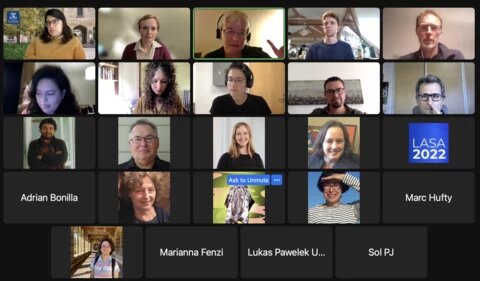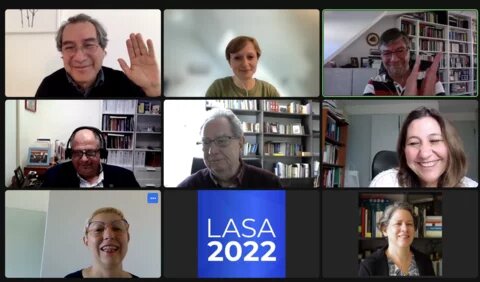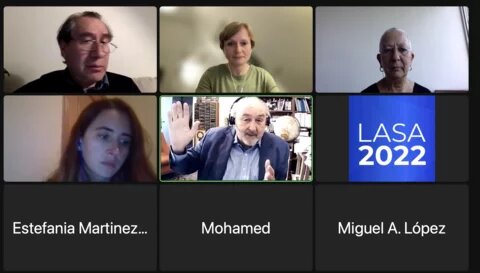The LASA Virtual Congress, entitled "Socio-environmental Polarisation and Great Power Rivalry", took place from 5-8 May 2022. With more than 13.000 members, the Latin American Studies Association (LASA) is the largest professional association in the world for individuals and institutions engaged in the study of Latin America. This year’s Congress was attended by more than 4.500 people from all world regions. Throughout the Congress, participants analysed current challenges faced by societies in Latin America and the Caribbean, particularly climate change, environmental destruction, socio-economic divides, and the rivalry between great powers that in one way or another affect the region. The aim of the Congress was to discuss recent academic works that account for both environmental destruction and the new models and practices that allow for its transcendence.
In order to contribute to the analysis and dialogue between experts from Latin America and the Caribbean and Europe to achieve the proposed goals of this Congress, the EU-LAC Foundation has convened the following panels and round tables:
- PANEL "A green deal for whom? The promises and pitfalls of EU-LAC sustainable commodity chains in the wake of global transformations" - Part 1 (5 May, 21:00-22:30 CEST) and Part 2 (5 May, 2022, 23:00-00:30 CEST)
- PANEL "The relationship between Europe, Latin America and the Caribbean: extra-regional interests and contemporary agendas" (7 May, 2022, 17:00-18:30 CEST)
- ROUNDTABLE: "The (post-)COVID-19 world: a paradigm shift? (7 May, 2022, 21:00-22:30 CEST)
The first Panel “A `Green Deal` for who? The promises and pitfalls of sustainable EU-LAC commodity chains in the wake of global transformations“ addressed the asymmetrical relationship between raw material producers and consumers, with costs and benefits of revenues from commodity exploration and production being distributed unequally. While many economies in Latin America and the Caribbean (LAC) continue to depend on commodity exports, newly emerging markets have reinvigorated efforts in the region to develop national industries and diversify exports. Meanwhile, consumer-driven sustainability policies and standards have emerged to alter the conditions of commodity production and address its negative social and environmental impacts. In particular, with its “Green Deal” the European Union (EU) has defined highly ambitious goals to support member states and partner regions such as LAC in transforming industries and reversing environmental degradation. These recent developments promise to transform the economically and ecologically unequal relationship between the two regions.
Therefore, in this panel, researchers from universities all around the globe presented their findings based on case studies – especially addressing the commodity of lithium – and discussed the manifold challenges involved both in social and environmental terms, in the setting up of sustainability policies and standards in local communities in Argentina, Bolivia, Chile, and Peru. Panellists also discussed how policies for sustainable commodity production and trade between the EU and LAC have evolved over time, and they drew scenarios for processes that could positively transform the traditionally asymmetrical negotiations between diverse actors, such as local communities, companies, investors, policymakers, and consumer organisations Session Organisers and Chairs were Dr Anna Barrera Vivero, Senior Programme Manager, EU-LAC Foundation & Jonas Köppel, Graduate Institute ofInternational and Development Studies - IHEID). Prof Dr Barbara Göbel, Director, Ibero-American Institute Berlin (IAI) took the role of Discussant, meanwhile, speakers included Diana Raquel Vela-Almeida (Norwegian University of Science and Technology), Thea Riofrancos (Providence College, USA), Ana Carballo (University of Melbourne, Australia), Maria-Therese Gustafsson (University of Stockholm), Marc Hufty (Graduate Institute of International and Development Studies), Ramon Morales Balcázar (Universidad Autónoma Metropolitana, Mexico), David Schröter (Université de Lausanne), Morgan Scoville-Simonds (Graduate Institute of International and Development Studies, Switzerland), and Carla Rodas Arano (Graduate Institute of International and Development Studies).
The second panel "The relationship between Europe, Latin America and the Caribbean: extra-regional interests and contemporary agendas" aimed to explore, from an interregional and comparative perspective, the evolution and central themes of the relations between LAC countries with Europe, the United States and the Indo-Pacific, particularly China, in order to identify interdependencies and vulnerabilities in the agendas and to establish an overview of the contemporary political and strategic interests of the LAC region. Panellists agreed that international relations were currently characterized by crises, uncertainty and a transition from a high degree of political and economic interdependence to a new ordering in which many actors would long for more autonomy and diversified relations. The participants identified the Sustainable Development Agenda, social policies addressing inequalities, green transition and digitisation as central pillars of a revitalised agenda of the current EU-CELAC strategic partnership. Dr Adrián Bonilla, Executive Director of the EU-LAC Foundation convened this session with Paz Verónica Milet García, Universidad de Chile as chair. Interventions were made by Luis Guillermo Solis, Professor - Florida International University, Director of the Kimberly Green Latin American and Caribbean Center; Anna Ayuso, Senior Researcher - Barcelona Centre for International Affairs (CIDOB) and José Antonio Sanahuja, Professor - Universidad Complutense de Madrid; Director of Fundación Carolina.
Lastly, the roundtable "The (post-)COVID-19 world: a paradigm shift?" departed from the hypothesis that the outbreak of the SARS-CoV-2 coronavirus had marked a turning point for contemporary world society. On the one hand, the establishment of states of emergency has affected the functioning of democracies. On the other hand, the collateral effects of the pandemic have had an impact on the conditions of governance, altering both the institutional and political order and the continuity of rules. Governments had to cope with an unprecedented situation that altered political priorities, the rules of coexistence and the capacity to act. In Latin America, these challenges occurred in a context marked by structural vulnerabilities and made this region one of the hardest hit not only in terms of contagion and deaths but also in economic terms. In order to address this issue from a multidisciplinary perspective, the EU-LAC Foundation has invited editors and authors of the recent publication „Atlas L21: The post-Covid-19 world, a paradigm shift?“ to reflect on this “turning point” and to address the question of how the pandemic has affected the Latin American region. The speakers Detlef Nolte, Research Associate - GIGA Institute for Global and Regional Studies, Associate Fellow - German Council on Foreign Relations (DGAP), Andrés Serbin, President of the Executive Committee of the Coordinadora Regional de Investigaciones Económicas y Sociales (CRIES), and Martha Singer, Faculty of Political and Social Sciences, National Autonomous University of Mexico (UNAM) also addressed the repercussions of the recent war of Russia against Ukraine in the LAC region and the reconfiguration of the international system. The session organiser was Dr Anna Barrera Vivero, Senior Programme Manager, EU-LAC Foundation and Chair Dr Melany Barragán, Editorial Latinoamérica 21.
The virtual panels and the roundtable convened by the EU-LAC Foundation in the context of the LASA Virtual Congress 2022 served to bring to the fore recent research outcomes and stimulate debates among experts about themes of vital interest for the relationship between Latin America and the Caribbean and the European Union.


